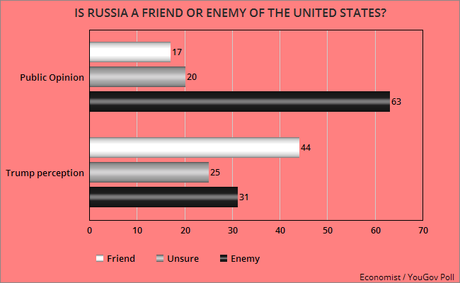
The chart above was made from info in a new Economist / YouGov Poll -- done between June 25th and 27th of a random national sample of 1,500 adults (including 1,295 registered voters), with a 3.1 point margin of error.
It shows that a substantial majority of Americans consider Russia to be an enemy of the United States (63%), while only a tiny minority consider that country to be a friend (17%). But Americans don't believe Donald Trump shares their view. About 44% think Trump views Russia as a friend, while only 31% think he views Russia as an enemy.
I think this brings up a valid question -- when Trump meets with Putin at the G20 summit this next weekend, will he stand up to Putin? Can he stand up to him? Will Trump vigorously defend the interests of the United States, or will he knuckle under to Putin (worst case scenario) or be noncommittal (best case scenario)?
Neither of those options is good for the safety and security of the United States, but there is reason to believe that Trump either won't or can't stand up to Putin and defend the interests of the United States (on election hacking, economic sanctions, Syria, Ukraine, etc.).
Every other president (of both political parties) has understood that Russia is not our friend, and they have all vigorously defended the interests of this country. But none of those presidents had the relationship with Russia that Donald Trump has.
Every day we learn more about the possible collusion between the Trump campaign and Russian officials to subvert the 2016 American election, and only a fool would believe this possible collusion occurred without the knowledge and direction of Trump himself. We know that Trump attempted to remove economic sanctions against Russia upon being sworn into office, and opposes the new economic sanctions (passed nearly unanimously by the Senate). Is this a quid pro quo for the Russian help during the election? Is he afraid the Russians will reveal his part in the collusion?
We also know that since U.S. banks are loath to loan money to Trump (because of his bankruptcies and failure to repay loans), and because of that, Trump's businesses are heavily indebted to Russian banks. Would Trump be afraid that Russian money would dry up if he stood up to Putin, or even worse, those loans would be called in?
The election of Donald Trump has put this country in a bad (and possibly dangerous) situation. We now have a president who won't (or can't) defend the country against its most powerful enemy -- Russia.

